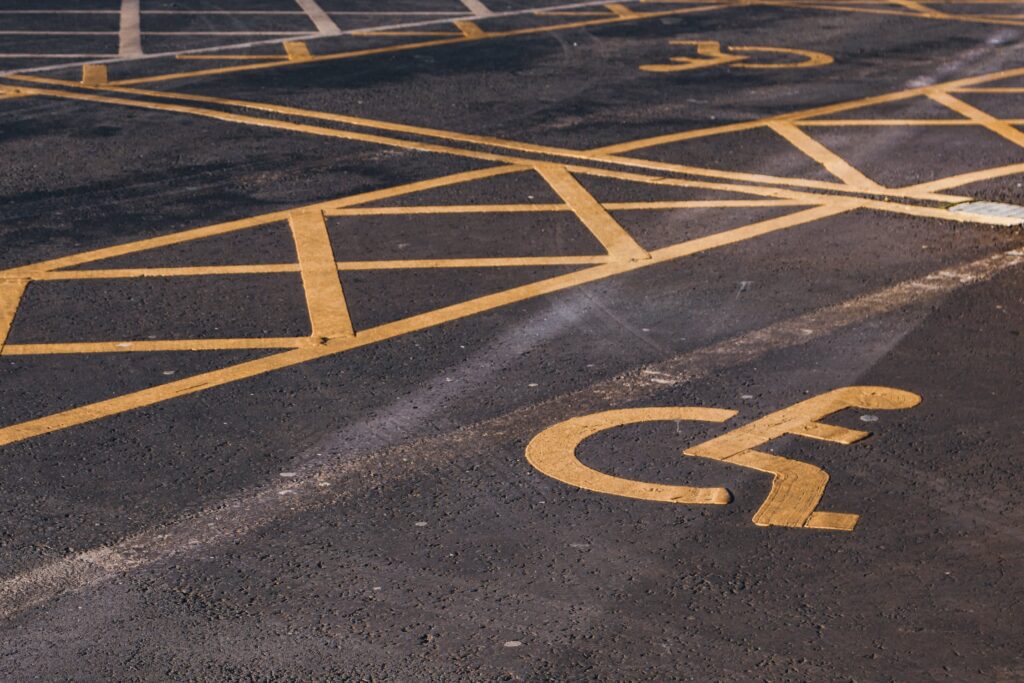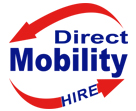Park closer to your destination with the Blue Badge Scheme, est April 2000. It has been designed for you or your passenger who has severe mobility problems.
Direct Mobility has put together this handy guide to provide more information on the Blue Badge scheme, including who is eligible and how to apply.
What is a Blue Badge?
The Blue Badge Scheme helps to provide easy access parking for people with restricted mobility. Designated parking spaces are placed closest to the point of interest, like a supermarket car park.
This scheme is available across the UK; however, the terms and conditions may vary depending on your residence location (England, Wales, and Scotland).
A Blue Badge costs up to £10 in England and £20 in Scotland. It’s free in Wales.
(You must reapply for a Blue Badge before your current one expires.)
Badges are typically valid for up to 3 years, however, conditions can vary.
If you are eligible for a Blue Badge, only you can use it. This means they can use it if someone else is picking you up or dropping you off.
Who can apply for a Blue Badge?
Blue Badges are intended for individuals with mobility impairments or other disabilities significantly affecting their walking ability.
- You receive a higher rate of the mobility part of the Disability Living Allowance
- You claim Personal Independence Payment if you cannot walk further than 50 metres
- Your mental health stops you from making journeys because of overwhelming distress
- You receive a War Pension Mobility Supplement
- You are legally registered as blind or severely visually impaired
- You receive a benefit under the Armed Forces & Reserve Forces Compensation Scheme within tariff levels 1 to 8.
- You have a permanent and substantial disability, which means you’re unable to walk or find it very difficult to walk
If you don’t automatically qualify, you may still be able to get a Blue Badge with the following:
- Hidden disabilities cause problems with your walking
- You often become highly anxious or fearful of public or open spaces
- You have a terminal illness
Applying for a Blue Badge
Apply or renew your Blue Badge online at GOV.UK.
Information and documents you need to have to apply:
- a recent digital passport photo
- proof of identity
- proof of address
- proof of any benefits you’re receiving
- your NI (National Insurance) number or child reference number (if applying for a child)
Before applying, make sure you meet the criteria for a Blue Badge and gather any required supporting documents.
The council may ask for further assessments to decide if you’re eligible.
How long does it take to receive a Blue Badge?
It can take up to 3 months to process your application, depending on your council and whether you need further assessment.
Keep in mind that it’s essential to apply for a blue badge well in advance if you have upcoming needs for accessible parking.
What if the application is refused?
If your application is refused, you can take some steps to address the situation.
- Your local council should tell you why it was refused. Ask them to reconsider and appeal the decision if you feel all of the important information was considered.
- If your initial application lacked certain information or documentation, provide these missing details to support your case.
- Seek assistance if you’re having difficulty with the appeal process. Many organisations can provide support and advice.
- Reach out to the organisations responsible for issuing blue badges in your area. They may be able to provide clarification on the reasons for refusal.
- In some cases, you may need to seek legal advice, especially if you believe your rights are not being properly considered.
Parking with a Blue Badge
It’s best to check and follow the rules and regulations in the area where you plan to park, as some local councils put additional restrictions on Blue Badge holders. The scheme is exempt from certain boroughs in London, which offer their own parking concessions.
- In many places, Blue Badge holders are allowed to park on single or double yellow lines for up to three hours, except where there’s a ban on loading or unloading.
- Blue Badge holders may also be exempt from certain parking metres and pay-and-display areas.
- Off-street parking – Blue Badge holders may have free or reduced-rate parking.
- Many areas provide dedicated parking bays for Blue Badge holders. These are usually located close to amenities and public buildings.
- Blue Badge holders may have permission in certain areas to enter pedestrian zones and other restricted areas.
- Time restrictions may apply for blue badge holders, so checking local regulations is essential.

Related Blogs:
